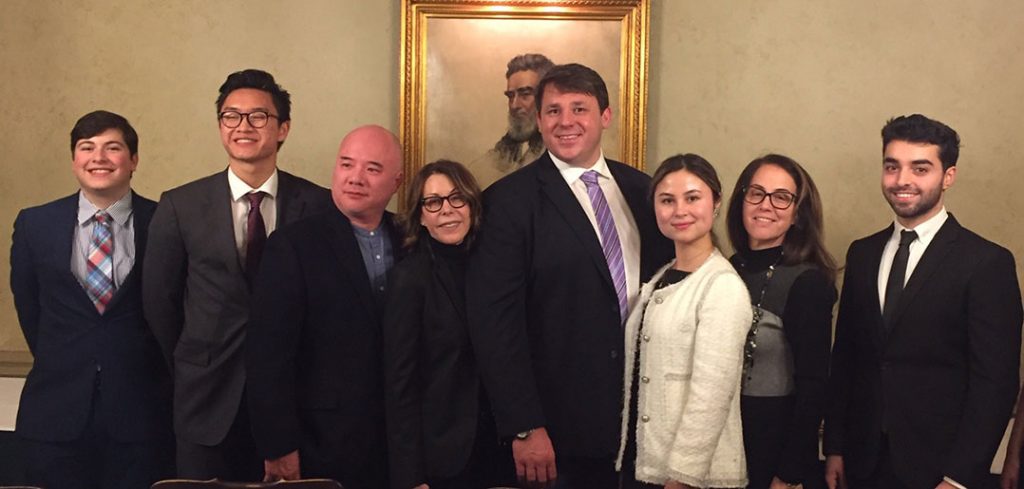If it’s true that money talks, Fordham is speaking volumes about its commitment to students who want to start their own businesses.
This fall, the University committed $100,000 to a new fund called the Fordham Angel Fund. Overseen by the Fordham Foundry, it will provide seed money to businesses run by current undergraduate and graduate students.
Donna Rapaccioli, Ph.D., dean of the Gabelli School of Business, said the fund, which will commit investments of up to $25,000 in individual businesses, exemplifies application-based learning and industry connectivity, which are key elements of the college’s approach to education.
“Launching the angel fund is another great opportunity for our students to get exposure to the real-world practices of an investment committee, and a chance at real-time decision-making with tangible outcomes,” she said.
“It will provide the added benefit of seed capital for worthy businesses that will add value to society.”
Al Bartosic, GABELLI ’84, the Foundry’s executive director, said the fund is in many ways the pinnacle of offerings that the Foundry can offer.
“We started with the basic mentorship, then we put a pitch challenge together; we’ve been doing that for four years. Last year we put our Ram’s Den competition, which was then called Venture Up!, together; we’ll be doing the second one this month,” he said.
“We wanted to give students an opportunity not just to get mentorship and guidance, but also, what a lot of them need is cash to work with their businesses.”
A Volunteer Effort
The backbone of the fund, which is open to students from all of Fordham’s nine colleges and schools, is two committees of volunteers staffed by students, alumni, and experts in venture capital including academics and working professionals.
The investment committee that will evaluate potential companies is made up of Kevin McQuillan, whose son Chase graduated from the Gabelli School in 2017; Vipin Chamakkala, GABELLI ’10; Donna Redel, LAW ’95; Jerry Wong, program director of the Gabelli M.S in Global Finance; and Bronson Lingamfelter.
“These are people who live, work, eat, breathe, and sleep venture capital or startups,” said Bartosic.
The task of locating companies that might be worth investing in, meanwhile, falls to members of the second committee, the Angel Fund Fellows. Though the position is also open to all undergraduate students,tthe first cohort is made up of Gabelli School students: seniors Tigerlily Cooley and Christian Pankovcin, and juniors Luis Navarro, Julia de Xavier, and Matthew Nguyen.
The fellows, who have been searching for investment-worthy companies since September, will present the investment committee with 15 potential investment opportunities this month. In January, the investment committee will whittle that list down to four or five finalists who will be invited to present their plans in person.
Bartosic said he expects that at least one company will receive funding. In March, the fund will refer that company to the Law Schools’ Entrepreneurial Law clinic, where law students will conduct their own due diligence.
“The goal is to give these fellows a taste of how a venture fund really works, so they understand that it’s not all just opening a business up, riding around on a skateboard, and feeling good about things. The due diligence is really the hard work,” he said.
Learning How Venture Capital Works
The fellowship program was an obvious fit for Tigerlilly Cooley, a global business honors program student at Gabelli Lincoln Center. She’s currently interning at venture capital fund Future/Perfect Ventures, and before that, she was a Venture Capital College Fellow at the Female Founders Fund. She also interned at Sony Music and currently fronts her own band, Bleachbear. The two fields are not so far apart, she said.
“I like meeting with people. I like client-facing things where you talk to other people. I have a band, but I’ve been thinking a lot about the business element of it. I kind of think of that as my startup,” she said.
McQuillan, a member of the investment committee, said he was excited by the opportunity to help students learn the ropes of the venture capital industry. It’s one he knows well, as he’s currently a general partner of OCA Ventures and the founder and general partner of Focus Opportunity Fund. He credited Rose McSween, Ed.D., senior director of development at the Gabelli School, with bringing him on board.
“We sat down one night and talked about how kids want to learn about starting businesses, and how Fordham needs to start one of these funds. She got a bunch of people to volunteer their time, and I was one of them,” he said.
“One of the key responsibilities in life is, you should help the next generation, and share your successes and failures so they don’t make the same mistakes. I’m doing this because I want to help the next generation. The motivated ones are the ones I get the most excited about.”
Bartosic said that when it comes to choosing companies, the Angel Fund will require them to meet standards such as the Environmental, Social and Governance Criteria (ESG), and those set forth by the Financial Accounting Standards Board (FASBE), but otherwise fellows will not be steered to specific industries.
“There’s a small subgroup of students that are steadily working away on their businesses while they’re at Fordham. We’ve seen them, we’ve identified several of them, and we’re sure there are lots and lots of them that never come to the Foundry,” he said, adding that Fordham entrepreneurs can be found beyond the Gabelli School.
“I just ran into someone from the Graduate School of Social Service who has a business, and we didn’t know about it, and she was like, ‘Can I get some help?’ So people are out there, doing these things.”

